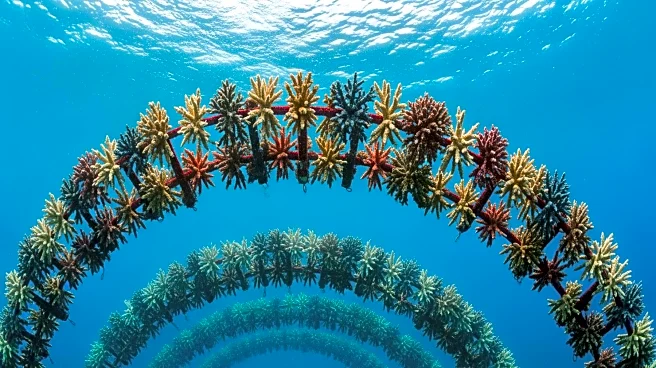What's Happening?
Recent studies have highlighted the challenges faced in coral restoration efforts, particularly focusing on the Great Barrier Reef. The research emphasizes that post-settlement mortality is a significant
bottleneck in coral recovery. Environmental factors such as wave energy and sedimentation have been identified as critical influences on the survival and growth of seeded corals. The study found that while hydrodynamic factors negatively impacted early survival, they were not long-term predictors of mortality. The research suggests that fine-scale environmental conditions at the device level, rather than broader environmental gradients, play a more crucial role in coral survival. This insight is crucial for improving large-scale restoration success, as it highlights the need for timing deployments to coincide with calmer periods to enhance initial survival rates.
Why It's Important?
The findings are significant for the future of coral restoration projects, which are vital for maintaining marine biodiversity and protecting coastal ecosystems. Understanding the specific environmental drivers that affect coral survival can lead to more effective restoration strategies. This is particularly important as coral reefs face increasing threats from climate change and human activities. The research underscores the need for adaptive management strategies that consider local environmental conditions, which could lead to more successful restoration outcomes. This has implications for policymakers, environmentalists, and the scientific community working towards sustainable marine conservation.
What's Next?
The study suggests that integrating long-term, fine-scale hydrodynamic monitoring into deployment planning could improve restoration outcomes. This approach, however, may face challenges due to cost and logistical constraints. Future efforts may focus on targeted deployments or pilot-phase assessments to refine site selection and deployment strategies. Additionally, further research into sediment characteristics and species life-history traits could provide valuable insights for site selection in reef restoration efforts.
Beyond the Headlines
The research highlights the complexity of coral ecosystems and the need for a nuanced understanding of environmental interactions. It also points to the potential for innovative restoration techniques that could be applied globally. As coral reefs are crucial for marine life and human economies, advancements in restoration science could have far-reaching impacts on global biodiversity and climate resilience.












